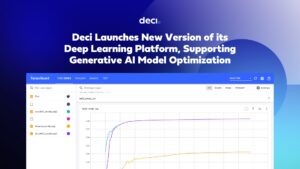
Deci Launches New Version of Its Deep Learning Platform Supporting Generative AI Model Optimization
TEL AVIV, Israel, Feb. 22, 2023 — Deci, the deep learning company harnessing AI to build AI, today released a new version of its deep learning platform, helping developers further simplify the AI lifecycle and break down additional barriers on the journey to production. With this new version, Deci’s platform will now support generative AI model optimization, as well as enhance existing inference acceleration and optimization capabilities with no accuracy degradation.
 “With the generative AI revolution upon us, it’s more important than ever for the industry to explore alternative approaches in order to make such models scalable. The hidden costs in terms of computational and financial resources required for these models to run are just too high, particularly the inference costs which are even more substantial in generative AI,” said Yonatan Geifman, Co-Founder and CEO of Deci. “The need to optimize these generative AI models has risen dramatically over the last few months. Fortunately, with our platform, developers can build, optimize, and deploy smaller, more specialized models for specific applications, effectively unlocking deep learning’s many advantages while removing development and production barriers.”
“With the generative AI revolution upon us, it’s more important than ever for the industry to explore alternative approaches in order to make such models scalable. The hidden costs in terms of computational and financial resources required for these models to run are just too high, particularly the inference costs which are even more substantial in generative AI,” said Yonatan Geifman, Co-Founder and CEO of Deci. “The need to optimize these generative AI models has risen dramatically over the last few months. Fortunately, with our platform, developers can build, optimize, and deploy smaller, more specialized models for specific applications, effectively unlocking deep learning’s many advantages while removing development and production barriers.”
Deci’s platform empowers AI teams in developing production-grade deep learning models. The platform simplifies and accelerates the development process with advanced tools to build, train, optimize, and deploy highly accurate and efficient models to any environment. The platform is powered by Deci’s proprietary AutoNAC (Automated Neural Architecture Construction) engine, based on Neural Architecture Search (NAS) Technology, that generates best-in-class deep learning model architectures for any task in any environment. The platform enables AI teams to accelerate inference performance by up to 10X, reduce inference costs by 5X, shorten development time by 80%, and lower development costs by 30%.
Deci’s new version includes:
- Support for generative AI vision and language model optimizations.
- Enhancements to Deci’s AutoNAC engine. AutoNAC’s new version generated a series of semantic segmentation models for edge and cloud use cases in automotive, image generation, among others, that broke the efficient frontier. These models outperform any known image-to-image models in terms of both speed and accuracy.
- Expansion of inference acceleration capabilities with support for INT8 selective quantization, allowing users to further speedup their models with no accuracy degradation.
- Expansion of the inference optimization capabilities beyond models with a new inference engine.
- Expanded framework support for TFJS, TFLite, CoreML
- Experiment tracking capabilities and model registry.
- Out of the box and on-demand support for new edge and cloud hardware, including NVIDIA’s latest Jetson Orin GPU family, the NVIDIA GPU A100 and A10g, and Intel Sapphire Rapids CPUs, on top of its existing support for Intel CPUs, NVIDIA GPUs, and other hardware types.
- Additional new features for enterprise clients, namely on-prem support (no data sharing, isolated VPC/env), workspaces with authorized access only.
For more information, visit the Deci website.
About Deci
Deci enables deep learning to live up to its true potential by using AI to build better AI. With the company’s deep learning development platform, AI developers can build, optimize, and deploy faster and more accurate models for any environment including cloud, edge, and mobile, allowing them to revolutionize industries with innovative products. The platform is powered by Deci’s proprietary automated Neural Architecture Construction technology (AutoNAC), which automatically generates and optimizes deep learning models’ architecture and allows teams to accelerate inference performance, enable new use cases on limited hardware, shorten development cycles and reduce computing costs. Founded in 2019, Deci’s team of deep learning engineers and scientists are dedicated to eliminating production-related bottlenecks across the AI lifecycle.
Source: Deci


























